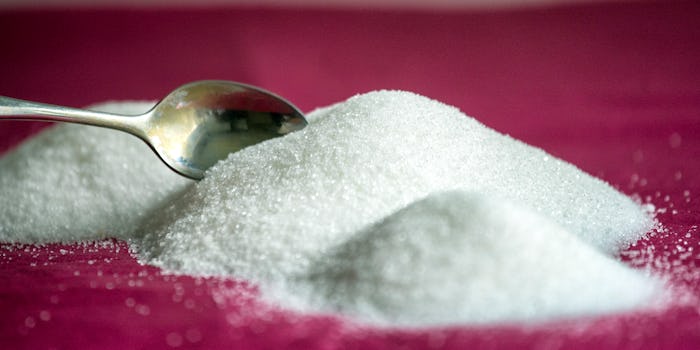Life

Sugar Industry Allegedly Paid Off Scientists To Say Saturated Fat Caused Heart Disease
For every parent who has ever wondered why it's so hard to find foods for kids that aren't loaded with sugar, a new bombshell report in the journal JAMA Internal Medicine might explain its prevalence across grocery store cereal aisles. According to new documents unearthed by researchers, during the 1960s, the sugar industry allegedly paid off scientists to say saturated fat caused heart disease. And the effects are still being felt today.
It goes like this: According to a report from The New York Times, in 1967, three Harvard researchers were reportedly paid what would be the equivalent of $50,000 today by the Sugar Association to write a paper arguing saturated fat was more detrimental to heart health than sugar.
The Sugar Association released a statement on Monday, admitting "the Sugar Research Foundation should have exercised greater transparency." But, the statement added:
Generally speaking, it is not only unfortunate but a disservice that industry-funded research is branded as tainted. What is often missing from the dialogue is that industry-funded research has been informative in addressing key issues.
The discovery of the documents revealing the dubious research was published this week in JAMA by a team including University of California, San Francisco professor Stanton Glantz. The report argues that we're still seeing the effects of the Sugar Association-sponsored research today.
The report allegedly exposed "internal sugar industry documents to describe how the industry sought to influence the scientific debate over the dietary causes of CHD in the 1950s and 1960s, a debate still reverberating in 2016," the JAMA report said.
This certainly isn't the first evidence of large food interests attempting to influence research and public policy. For instance an investigation from June found a professor at Louisiana State University worked with the National Confectioners Association to come up with data to support the conclusion that kids who don't eat sugar weigh more than those who do, according to Bloomberg.
As Marion Nestle points out in the same JAMA Internal Medicine issue, according to NPR, "In 2015, The New York Times obtained emails revealing Coca-Cola's cozy relationships with sponsored researchers who were conducting studies aimed at minimizing the effects of sugary drinks on obesity." As any parent knows, those are the very same drinks that kids obsess over at the grocery store, and the same ones they clamor for in lunch boxes. So what now?
A National Health and Nutrition Examination Survey (NHANES) survey released in August noted that "nearly 16 percent of the calories in U.S. children's diets are from added sugar," according to a report by the Mayo Clinic's Katherine Zeratsky, R.D., L.D. What's worse, she noted, was that the statistics were likely even higher than that, given that NHANES self-reported its numbers, which usually leads to low estimates.
"Added sugars contribute to a diet that is high in calories but low in nutrients. This type of diet increases the risk of obesity, hypertension, cardiovascular disease and some cancers," Zeratsky wrote. "The American Heart Association recommends that children's diets contain no more than about 6 teaspoons (25 grams) of added sugar a day. Currently children are averaging 80 grams a day by conservative measures." The most blatant offenders on the sugar-laden list? "Sodas, sports drinks and other sugar-sweetened beverages such as tea or coffee drinks."
This means one thing: Whether we knew it or not, parents were being led to believe that those sports drinks their kids downed at soccer practice, the sodas they had at the movie theater and beyond weren't so innocent. In reality, they were much worse than questioning whether or not the kids put too much butter on the popcorn.
The Sugar Association has since criticized JAMA's publishing of the historical documents linking the group to the questionable research, saying it's a disservice to the broader public. "Generally speaking, it is not only unfortunate but a disservice that industry-funded research is branded as tainted," The Sugar Association statement said. "What is often missing from the dialogue is that industry-funded research has been informative in addressing key issues."
Whatever the case may be, one thing is clear: As parents, all that's left to do is hope this revelation will help drive a discussion over how much politics and corporate profits are driving our country's conversation about nutrition.